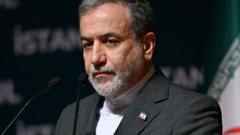In a significant breakthrough amid escalating trade tensions, the US and China have decided to reduce their tariffs on each other's imports for a period of 90 days. The reduction comes after constructive talks in Switzerland and aims to stabilize both economies.
US and China Reach 90-Day Tariff Reduction Agreement

US and China Reach 90-Day Tariff Reduction Agreement
A temporary reduction in tariffs has been agreed upon by the US and China, aiming to alleviate trade tensions following recent negotiations.
In a vital step toward easing trade tensions between the United States and China, both nations have announced a temporary agreement to slash mutual tariffs on imports for a duration of 90 days. US Treasury Secretary Scott Bessent confirmed that the reduction will see tariffs cut by 115%, a welcome development following a series of heavy tariffs imposed by both sides earlier this year.
These talks were conducted in Switzerland over the weekend, marking the first direct discussions since US President Donald Trump imposed steep tariffs on Chinese goods in January, a policy aimed at addressing the trade imbalance between the two nations. Trump's initial tariffs included a significant 145% levy on imports from China, to which Beijing retaliated with a 125% tariff on select US products.
The ramifications of these tariffs had been felt widely, resulting in considerable turmoil in global financial markets and escalating fears of an impending global recession. Experts have noted that the trade dispute poses risks not only to bilateral relations but could also have wider implications on the global economy.
With the new agreement, the tariffs on Chinese imports into the US will be temporarily reduced to 30%, while the tariffs placed by China on US imports will see a decline to 10% for the 90-day period. This reduction may provide some breathing room for businesses and consumers, as both nations strive to navigate the challenges of their complex economic relationship.
While proponents of free trade may view this as a positive step forward, some critics caution that the underlying issues that led to the tariff imposition remain unaddressed. The agreement is seen by many as a necessary but uncertain truce in a broader conflict, raising questions about the potential for a more permanent resolution to ongoing trade disputes.



















